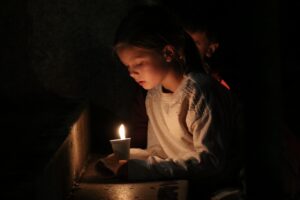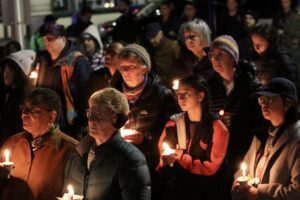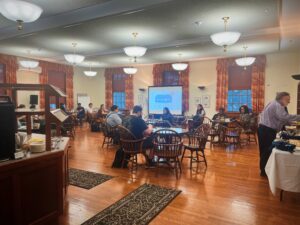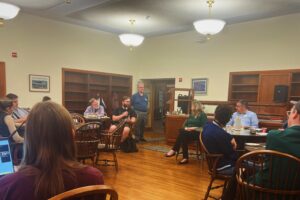Posted on 09 October 2023.
09/15:
At 8 a.m., a student filed an information complaint against another student in York Hall. The student whom the complaint was against was removed from the building by Title IX.
At 2 p.m. a property damage crash was reported from the Collins Center for the Arts parking lot. A parked car was hit, but nobody was harmed by the accident.
Around 10 p.m., a criminal mischief report was filed in Androscoggin Hall when three exit signs were damaged. The suspect was not found when the University of Maine Police Department (UMPD) arrived on the scene.
09/16:
Around 1 a.m., someone reported an intoxicated student at Penobscot Hall. University Volunteer Ambulance Corps (UVAC) was contacted, but the individual refused transport. The case was referred to student conduct.
At 2 p.m., there was a call regarding a marijuana odor at Sodder Hall. Suspects were not found.
Just before midnight, someone reported a domestic situation from Penobscot Hall. A female was seen tugging on a male’s shirt. She left the scene in a vehicle, and he was also nowhere to be found.
09/17:
At 6 a.m. a student called about an information complaint after receiving a series of suspicious emails. The case was forwarded to the IT department, and it was discovered to be a catfisher.
Around 1 p.m., there was a property damage crash at the Aroostook parking lot, which turned out to be a hit-and-run against a parked vehicle. There is currently no information on the suspect.
09/18:
At 2 a.m. an information complaint was issued by Witter Farm on College Avenue, as a suspicious vehicle parked there with its headlights off. It turned out to be a male taking a phone call.
At 2 p.m., there was a property damage crash reported at the New Balance Student Recreation Center parking lot following a hit-and-run. There was no evidence found from the camera footage. Also, there was a reported theft from Witter Farm, as two wooden pallets were stolen from the property. Suspects have not been found.
Around 10:30 p.m., an information complaint was issued against an individual who was allegedly screaming in Aroostook Hall. When UMPD arrived at the scene, no one was found on any of the floors.
09/19:
At 8 a.m., there was a reported harassment complaint from Somerset Hall filed against an individual who was speaking disrespectfully to another person.
At 11 a.m. there was an information complaint from Mail Services, regarding a suspicious vehicle parked on Munson Road. Nobody was discovered inside the car.
Around 7:30 p.m., there was a reported property damage crash on Rangeley Road, when two vehicles collided at the Belgrade intersection. Nobody was injured in the process, but damage was done to both vehicles, and an accident report has been filed.
Around 11 a.m., there was a hit-and-run outside of Hilltop with no suspects found.
09/20:
At 12:30 a.m., a property damage crash occurred outside of Nutting Hall. It was also a hit-and-run with no suspects.
09/21:
Around 4:30 p.m. a suspicious complaint was made from the New Balance Student Recreation Center parking lot against two people wearing camouflage and carrying rifles. When officers made contact, the individuals stated they were in Reserve Officers’ Training Corps (ROTC) and doing drills.
At 5 p.m., there was a theft in Cumberland Hall. A resident claimed that two pairs of sweatpants were taken from her room. Upon further investigation, it was discovered that no unauthorized person had entered her dormitory.
At about 11 a.m. a suspicious complaint was made from Island Avenue, where individuals were seen participating in arson. It turned out that they were instead smoking cigarettes.
09/22:
At 12 a.m., a call was made regarding an intoxicated female at Cumberland Hall. UVAC arrived at the building, though she refused transport and was reported to conduct.
At 1 p.m., a staff member at the Counseling Center filed an information complaint after receiving multiple strange emails.
Around 2:30 p.m., an individual filed a criminal mischief report from the Belgrade parking lot after discovering their vehicle had been scratched.
Around 5 p.m. there was a reported bicycle theft from Flagstaff Road, outside Neville Hall.
09/23:
At 1:30 a.m. a concerned student filed a missing person report. The student had a male friend visiting from out of town, but the friend was located at a female’s dormitory the following morning.
Around 2:30 a.m., there was a reported intoxication when an underaged student was found passed out in a ditch in front of Doris Twitchell Allen Village (DTAV). They were not physically harmed.
At 3:30 a.m., a suspicious complaint was made regarding an unknown male knocking on doors at Oak Hall. UMPD arrived at the scene, but no one was found.
Around 7:30 a.m., an information complaint was issued from Oxford Hall about a suspicious male prowling the fourth floor. He ended up being the missing person from the missing person report that was made a day prior.
Around 10:30 p.m., a suspicious complaint was made by a female on Long Road. Two males on scooters were harassing her. There are no details of the crime.
09/24:
At 1 a.m., criminal mischief took place at Knox Hall with a broken window reported. About 20 minutes later, another call was made regarding a second window being damaged by objects thrown from outside. UMPD found the person responsible.
At 2 a.m., there was another report of window damage, this time at Somerset Hall. A suspect’s name was given, and the person admitted to the mischief.
Around midnight, criminal mischief took place at Androscoggin Hall after two exit signs were reported missing along with a bathroom door removal, beer cans in the toilet and garbage thrown everywhere. The suspect was caught.
09/25:
At 3 p.m., criminal mischief was reported at the Steam Plant Lot, when an individual discovered that their tires were slashed.
Around 10 p.m., UMPD received a call about an alcohol offense. Two underage students were located in possession of alcohol, and the issue was submitted to conduct.
09/27:
Around 10 a.m., an information complaint was made by an individual who discovered a fake parking ticket on their vehicle. The ticket did not include any sort of address to send money.
At about 2 p.m., a property damage crash occurred in the Belgrade parking lot. A parked car was discovered to have damage on its door.
Around 5:20 a.m., there were 19 signs damaged in Somerset Hall. UMPD found three people responsible and charged them for the mischief.
At 8:30 p.m., UMPD received a suspicious complaint about the odor of marijuana being present in the Hilltop parking lot. Several students were found in the vehicle where the scent was coming from. Each of them were reported to student conduct.
At 10 p.m., there was a theft complaint regarding a stolen exit sign in Androscoggin Hall. Thirteen minutes later, a similar theft was reported from the same building after another exit sign was taken from the third floor.
09/28:
At 3:30 p.m., an information complaint was filed by a distressed female on the Mall, who reasonably suspected that her backpack was air-tagged. She was taken to the UMPD station, but nothing was found.
09/29:
At 6 p.m., there was a call regarding a requested removal of a student’s ex-boyfriend. The reported male was found in her building and removed from campus by UMPD.
Around 1 p.m., there was an alcohol report from Oxford Hall. UMPD officers discovered the scent of intoxicating beverages, but no alcohol was found on the person. It was still sent to student conduct.
09/30:
At 8 p.m., there was a reported theft of exit signs stolen from Androscoggin Hall.
Around midnight, there was an alcohol offense at Somerset Hall. Three females under the age of 21 were found intoxicated and, therefore, referred to student conduct.
10/01:
At midnight, there was a reported intoxication at Knox Hall. Two underage females were sent to student conduct once UMPD arrived on the scene.
Around 11:30 a.m., there was a harassment call from Somerset Hall made by a female who attended a party on College Avenue and was harassed by her ex-boyfriend. The male ended up being removed by fraternity brothers in that household.
10/02:
At 9 a.m., someone reported that an individual maliciously placed a stick on a Kiwibot, so it couldn’t close. There was no damage.
At 12 p.m., an individual reported that $30 was stolen from her bag during the football game the previous afternoon.
10/03:
Around 7 p.m., there was a bike theft in front of Knox Hall. No suspects were discovered.
10/04:
At 11 a.m., there was a property damage crash in front of Neville Hall that turned out to be a hit-and-run.
Around 1 a.m., an information complaint was made regarding an accident in the Dunn Hall parking lot. Damage was made to a vehicle, and UMPD attempted to contact the owner but received no response.
Around 4 p.m., a drug complaint was reported at the Bears Den in the Memorial Union when pills were found underneath a dining table. The drugs have not been tested and could very well be vitamins. The investigation is ongoing.
At 7:30 p.m., there was a property damage crash involving a bus at the Hilltop parking lot, but nobody was injured.
10/05:
Around 12:30 p.m., a staff member at Boardman Hall filed a theft complaint after their name plate was stolen from outside of their office.







